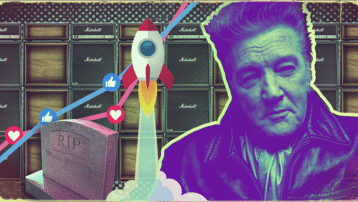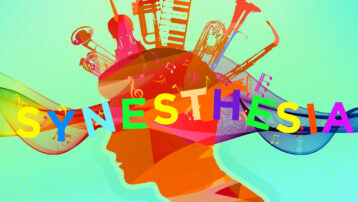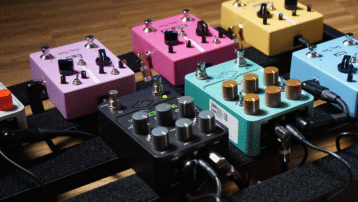It has long been scientifically proven that listening to music can reduce anxiety and pain and even lower your blood pressure. It can also improve sleep quality, mood, mental and rational performance, and even memory. Here are some examples of the power of music.
1. Music makes memories tangible
Music has the very special power to bring blocked or deeply buried memories to the surface. For example, a particular song can remind you of a wonderful experience you may have had decades ago. On the other hand, it can also bring back pain that you once felt and flush your brain with grief from the past.
Therapists, for example, use music in the care of Alzheimer’s patients to bring back seemingly lost memories. As a result, people who were thought to have lost their memory suddenly start humming and singing along to the lyrics of their favourite songs from the past.
You are currently viewing a placeholder content from YouTube. To access the actual content, click the button below. Please note that doing so will share data with third-party providers.
2. Distraction as a painkiller
Of course, music isn’t something that we ingest physically, so it isn’t the same as an anti-pain medication we would swallow. And yet it is one of the most efficient ways to alleviate pain.
The idea is that listening to music shifts your focus. Even if the pain, such as a migraine, was still at the centre of your attention moments ago, the music suddenly takes centre stage. In a way, music helps raise the threshold of pain tolerance. The pain is still there, but you just don’t have time to notice it.
3. The phenomenon of musical goosebumps
Goosebumps are a physical reaction that we develop when we are afraid, cold, or emotionally moved. Some people also get goosebumps when they hear certain high frequencies or enchanting classical music.

There is an explanation for this. In those who are sensitive in this way, the brain releases chemicals that raise the pulse and body temperature and increase the electric conductivity of the skin. If the nervous system now sends out electrical impulses, tiny muscles in the hair follicles are stimulated. That’s why you sometimes get goosebumps without feeling scared or cold.
4. Music can train auditory memory
As if we knew it: we like things that feel familiar, whether it’s a taste, image, or piece of music. Throughout our lives, we develop a preference for certain sensory stimuli. Initially, these are mainly harmonious sounds, such as a mother’s voice or simple nursery rhymes.

At some point, however, these are no longer enough for the ear, i.e. the brain. The sounds become more and more differentiated, and the music we prefer gets more complex. The so-called auditory memory can be trained for anything, even dissonant music.
5. Music as an emotional reward
Nowadays, there is an abundance of research on topics that seem difficult to explain at first glance. One of the questions examined is whether music is capable of making us addicted. Who hasn’t experienced this? There are certain songs that we fall in love with and want to listen to over and over again in a continuous loop.
Studies have shown that emotionally charged music can activate our reward system in the same way as drugs. (Please don’t!) Once hooked, we can’t live without this energy, power, and joy. Give me more! And yes, in this sense music can also become an addiction – probably the healthiest one there is.
6. Music improves our reaction time
Years ago, a study by the University of Montreal examined the sensory abilities of musicians. Among the test subjects, musicians were found to have demonstrably shorter reaction times compared to non-musicians, no matter which instrument they played.
It was concluded that learning to play a musical instrument can have a positive effect on older people in particular. The idea is that making music could improve their ability to react quickly and remain more attentive in everyday situations. Many a careless fall could perhaps be avoided.
7. The musical high
Making music and listening to music can both trigger the same effects in the brain as food, sports, sex, or intoxicating substances. This is by no means an unfounded theory, but a scientifically proven fact. The brain releases more of the body’s own happiness hormones and the neurotransmitter dopamine.

At the same time, the production of the stress hormone cortisol is reduced. A marvellous combination. We seem to float on a “musical high” without being able to explain it. Sometimes, it’s perhaps best not to worry about finding an explanation. The fact is that music releases emotions that we should simply enjoy.
8. Music unites and promotes trust
When we make music together with others or experience a concert in a group, for example, another wondrous bodily substance comes into play. Oxytocin – the so-called bonding hormone – is said to promote trust and affection between people. As a result, you automatically feel comfortable and secure in a community.
And this effect is by no means limited to a certain type of music – it occurs in fans of any style from sentimental folk to aggressive metal. It’s simply about not feeling alone or even lonely. This is probably the reason why so many people celebrate together to pop songs.
9. Amazing connection between the brain hemispheres
It’s no secret that we musicians are somehow different – something that most of us seem to be quite proud of. Beyond the shoulder-slapping, however, scientific studies have proven exactly that. For example, the brains of professional musicians differ from those of non-musicians.
The link between the two hemispheres of the brain, which bears the amusing medical name corpus callosum, is significantly more developed. Thus, the two halves of the brain can communicate better with each other. Isn’t it great when the right hand knows what the left hand is doing for once?
10. Music activates the brain in many ways
The so-called Mozart effect was discovered more than 40 years ago. At that time, it was found that listening to music – in this case Mozart’s music – leads to better results in intelligence tests. Although the results of that study are now outdated, it is still assumed that the presence of music not only improves well-being, but also concentration. No, this doesn’t mean that music makes you smart. But it is now an indisputable fact that it activates the brain. There’s something about the synapses dancing the tango.
Music and emotions: your feedback
Have you ever noticed that your brain really jumps for joy when making or listening to music? How does music affect you? We look forward to an exchange of endorphins in the comments.






















Comments 5